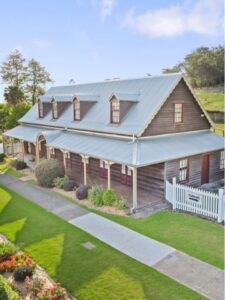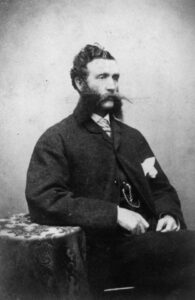‘Duels were now only fought by snobs’.
Most of us would think that duelling was a barbaric and outdated way of settling an argument. Duels were originally fought not to kill the opponent (although many were killed) but to restore one’s honour by demonstrating a willingness to risk your life for it. This practice mostly fell out of favour in England by the middle of the nineteenth century
This changing view of duelling can be seen in two events that I came across while researching family stories. The first event related to my 3x great-grandfather, John Harris who I discovered had been the key person in preventing a duel during the voyage of the Second Fleet in 1790.
John Harris came to New South Wales on the Surprize, one of the ships of the Second Fleet. He was a surgeon with the 102nd Regiment. John Macarthur, a lieutenant of this Regiment and later the pioneer of the Australian Merino wool industry, and his family, were also on a Second Fleet ship, the Neptune. As the fleet made its way from London to Portsmouth on its first leg of the journey, there was a dispute between John Macarthur and the captain of the Neptune, Thomas Gilbert, about the amount of cabin space the Macarthur family had on the ship and the smells around their cabin. Tensions escalated with Macarthur calling Gilbert a ‘great scoundrel’ and Gilbert telling him that,
he had settled many a greater man than him, and that he was to be seen on shore, on which Mr. McArthur said he would see him at 4 o’clock at the Fountain Tavern, Plymouth Dock.
With these words, John Macarthur challenged Gilbert to a duel and chose John Harris as his second, possibly because Harris was a surgeon. A second was a trusted individual who acted on behalf of one of the duelists to attempt to prevent the duel through reconciliation but if that failed, oversee the duel’s conduct. Harris was successful in averting a duel as he reported later that the duel was bloodless and that ‘both parties agreed to live in harmony in future, as they were both satisfied with each other’s apologies.’ However the saga did not end there as John Macarthur was eventually transferred to the Scarborough and Gilbert was replaced by Donald Trail as captain of the Neptune.[1]
There was a gradual change in public opinion in relation to duelling during the first half of the 19th century as people increasingly viewed it as an unacceptable way to solve differences. Its use gradually declined which is illustrated in the second example which happened over 50 years later.
This event took place in 1853 after a case had been heard before the Bench of Magistrates at the small town of Drayton in the north of the colony of NSW. This case related to two Chinese people who made a complaint that they had not been paid wages under their contracts with a Mr James Cumming Pearce from Perseverance Station.[2]
After hearing the case, the Bench ordered that the wages were due and drew an order on Mr Pearce for payment and also discharged the two Chinese men from their agreements. Mr Pearce ‘had been so sure that the usual verdict in favour of the employer would be returned he did not take the trouble to appear.’ An article published in the Truth many years later claimed that Joshua Bell, my great grandfather and the magistrate who had presided in this case,
… was the first of the squatter J’s.P. to give careful and just consideration to cases under the oppressive Masters’ and Servants’ Act, and, to the horror and indignation of the squattocracy, he not infrequently decided in favour of the employed as against the employer.[3]

Royal Bulls’ Head Inn, National Trust of Australia (Queensland).
A few days later Mr Pearce appeared at the Court House at Drayton requesting that the case be heard again but his request was denied. Mr Pearce did not back down and later met Joshua Bell on the verandah of the Royal Bulls’ Head Inn (also known as Horton’s Inn) to ‘have it out’. There was a war of words and Mr Pearce used insults against Joshua Bell and his family.
Later Joshua wrote to Mr Pearce saying that if he apologised publicly for the offensive words he had used, he would not take action. Mr Pearce agreed to withdraw his words against Joshua’s family but not about Joshua himself. Consequently Joshua took civil action for slander against Mr Pearce.
This action was heard at the Brisbane Circuit Court on 20 May 1854. The evidence showed that Mr Pearce had used slanderous language against Joshua and also ‘imputing partiality and injustice to him as a magistrate.’ During their altercation, Pearce had stated that ‘You did not behave on that occasion like a friend’. A witness explained that Joshua had not wanted to have the fight with Pearce. ‘I don’t want to have any row with you, Pearce, I wish you’d desist and let me alone!’ But Pearce did not desist and called Joshua Bell ‘a d——-scoundrel several times, and said that, like all the b——-magistrates on Drayton Bench, he sided with Hodgson.’[4]
During the court case Joshua said that he could have participated in the
… now exploded and barbarous custom of duelling, which might formerly have been practised on an occasion like this and called upon the jury to justify the plaintiff on the occasion of this more civilised and gentlemanlike course of an appeal to the law of his country, as duels were now only fought by snobs.

Joshua Peter Bell. (n.d.). Out of copyright. State Library of Queensland.
In summing up, the Judge, Mr Justice Dickenson, stated that the only issues the jury needed to focus their attention on
… were those imputing partiality as a magistrate and that abominable expression, “_____,” which might be intended to impute a crime of very serious character. With regard to the latter, that expression was so common in this country, even, he was sorry to say, among children, that they would have to consider whether anything more than mere abuse was meant on that occasion.
With reference to Pearce’s charge of Joshua’s partiality as a magistrate, the Judge said that Pearce’s own statement, ‘You have not decided in my case like a friend’ could be held to convey a compliment on Bell’s impartiality. Joshua was awarded £200 in damages.
As so often happens in researching the lives of our ancestors, their stories shed light on the times in which they lived, and this helps us understand the impact that various events had on their lives. Isolated incidents can open up whole areas of research, which is what happened when I saw references to duelling during the voyage of the Second Fleet and to a court case in a remote northern town of the colony of New South Wales.
[1] Surgeon Harris’s Account of the Quarrel Between Captain Gilbert and Lieutenant Macarthur, November 1789, in F. M. Bladen (ed.), Historical Records of New South Wales, Vol. II—Grose and Patterson. 1793–1795, (Sydney: William Applegate Gullick, Government Printer, 1893), p. 428.
[2] The Moreton Bay Courier, 1 October 1853, p. 2, col. 3-4. Accessed 25 June 2025. http://nla.gov.au/nla.news-article3711530 After the transportation of convicts ceased in 1840, pastoralists no longer had free labour to fill the roles of shepherds, labourers and servants. Hence indentured labour was introduced and the first Chinese indentured labourers arrived at Moreton Bay in 1848. Between 1848 and 1853 about 900 Chinese indentured labourers were imported to Moreton Bay.
[3] Truth, 3 October 1915: Accessed 19 Jun 2025 http://nla.gov.au/nla.news-article203044787
[4] The Moreton Bay Courier, 20 May 1854: Accessed 25 Jun 2025 http://nla.gov.au/nla.news-page542515 Arthur Hodgson was a magistrate and had a positive view of the Chinese people he employed as shepherds.

Comments
‘Duels were now only fought by snobs’. — No Comments
HTML tags allowed in your comment: <a href="" title=""> <abbr title=""> <acronym title=""> <b> <blockquote cite=""> <cite> <code> <del datetime=""> <em> <i> <q cite=""> <s> <strike> <strong>